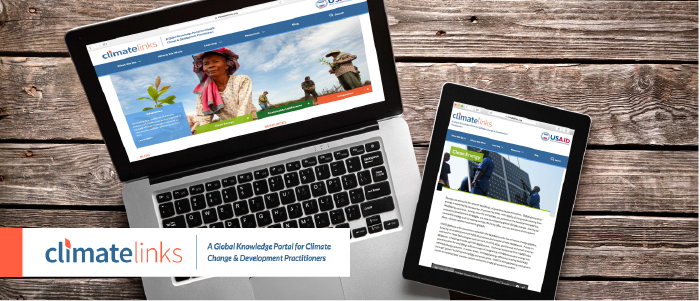Blog • Insights
A Global Low-Carbon Footprint: Launching Climatelinks.org
In Washington, a lot of people working on policy issues are used to operating in a silo, but that’s just not how things work when you’re talking about climate change.
While news organizations are still trying to wrap their heads around that idea, agencies like USAID are taking a holistic approach in addressing climate change as a global issue. Since beginning implementation of their Climate Change & Development Strategy in 2012, USAID has focused on helping those in developing countries reduce their emissions, invest in clean energy technology, and adapt as best they can to a changing planet. Along with domestic initiatives like the Clean Power Plan, the goal of this work is both to reduce worldwide emissions and build support for an international climate agreement, discussions for which will take place next month in Paris.
Since 2013, Forum One has been working with our partners at Training Resources Group and Engility/IRG to support USAID’s Office of Global Climate Change on their communications and knowledge management strategies. Early on in that process, we identified a need for a “one-stop shop” for USAID climate change resources that could help inform development practitioners working in a variety of areas. Both USAID staff and their implementing partners needed a resource that could provide the best information on how to integrate climate-smart practices into their ongoing work. USAID was also interested in providing greater transparency into how climate change funding is being used around the world, and how their work benefits the people in developing countries. Thus was born the idea for Climatelinks.

Over time, USAID hopes to use this new resource to learn from and support the community working on climate change and international development issues. Our team is launching the site with over five hundred technical resources, over a hundred country-specific profiles on USAID’s climate change and development portfolio, dozens of training events and webinars, and summaries of global climate change news from around the world. Users of the site can post comments and assign star ratings to blog posts and resources – USAID’s hope is that these features will help users provide feedback on what information is most useful in their work, and what types of new content we should include in future updates. Users can also suggest events and technical resources for inclusion on the site via Google forms.
If you’re interested in learning more about Climatelinks, you should read this blog post by Amy Daniels, the Global Climate Change Offices’ knowledge management specialist, and the primary champion of the site within USAID. You can also follow Climatelinks on Twitter and YouTube.
In the future, we plan to explore adding community functions to Climatelinks to allow users to save, curate, and share their own personalized lists of content, and continuing to add feedback mechanisms to help USAID headquarters staff learn how to better support the community.
Climate change continues to be a major focus of the Obama administration, and we at Forum One are excited to be able to help raise the profile of this issue, and to support the men and women working around the world to help communities reduce their emissions, and adapt to the realities of a changing planet.